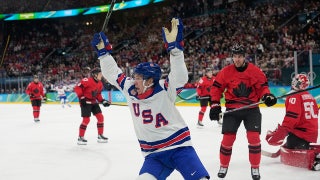GENEVA – Invited by FIFA to propose reforms, Transparency International has urged world soccer's governing body to order independent investigations into past corruption allegations to help overcome a "crisis of trust."
The global anti-corruption watchdog has advised FIFA to create an independent group of soccer's stakeholders — including fans, sponsors, clubs and members of the media — which could oversee the probes and other widespread changes.
FIFA President Sepp Blatter asked Transparency International for help after allegations of election bribery, World Cup vote-rigging and officials unethically seeking favors tarnished the organization's reputation.
The suggested reform agenda is outlined in a tough-talking, eight-page document.
"Football's governing body must be an example of the fair play that it promotes on the pitch," Transparency International said in a statement.
The Germany-based global monitor calls on FIFA to review how it investigates alleged corruption and publish more detailed financial reports, including executive bonuses and staff salaries.
FIFA should also protect whistleblowers, impose two-term limits for elected officials and open its decision-making to outside scrutiny instead of being "opaque."
The report suggests that FIFA's 208 national members must comply with all reforms as a condition of playing in the World Cup or receiving funds from FIFA's $1 billion-plus annual income.
Blatter promised to clean up his so-called "football family," and change how it does business, after winning election to a fourth and final four-year presidential term in June.
"I think he has understood that something has to be done," the report author, Sylvia Schenk, told The Associated Press in a telephone interview.
Blatter's former election opponent Mohamed bin Hammam was banned for life last month after being judged by FIFA's ethics committee to have arranged bribes for Caribbean voters. Bin Hammam denies the charge and has said he will appeal.
FIFA vice president Jack Warner resigned rather than face investigation for his alleged role in the scandal. Two other executive committee members, Amos Adamu and Reynald Temarii, were suspended last year after being investigated over World Cup vote-trading.
The ethics committee is investigating 16 Caribbean officials suspected of accepting $40,000 cash bribes from bin Hammam.
However, the report said the ethics panel was not truly independent because it does not have power to launch cases, and can only examine cases referred by FIFA.
In a statement Tuesday, FIFA said it "read with interest" what was proposed, though it was already meeting Blatter's zero-tolerance promise to tackle corruption.
"While FIFA acknowledges that work remains to be done, it is convinced that the measures which have been implemented and the direction which has been taken will help to further strengthen FIFA's governance," it said.
Blatter met with Schenk, TI's sports adviser, on the morning of the Women's World Cup final in Frankfurt last month.
"We had an open discussion," said Schenk, who has since inspected FIFA's operations in Zurich.
Blatter's organization "opened its books" to Transparency International experts, who typically advise governments and corporations how to introduce best practice in honest management.
The report, titled "Safe Hands: Building Integrity and Transparency at FIFA," suggests that soccer's 107-year-old governing body has been secretive.
"People across the world, in all walks of life, are calling for an end to 'business as usual'," the report says.
"FIFA has to start with an independent investigation to clear up the corruption allegations from the past," TI advised, calling for forensic accountants and special investigators to be appointed.
Schenk said cases including the 2001 bankruptcy of FIFA's former marking partner, ISL, "have not been dealt with comprehensively."
FIFA "could help to end, or at least accelerate," the report said, the release of Swiss court documents revealing which soccer officials took millions of dollars in kickbacks from ISL. Kickbacks worth $7 million were repaid last year, but FIFA has blocked the court from revealing which officials were involved.
Schenk said fans and media could suggest other cases they believe FIFA covered up.
"We need something like a public call for allegations and then the multi-stakeholder group can decide what is important to investigate," she said.
FIFA should open "high risk"decisions, such as awarding World Cup hosting rights, to more external scrutiny. Broadcast rights deals — worth $2.4 billion for the 2010 World Cup — and distribution of World Cup tickets should also be closely monitored, the report said.
Bonuses and pensions for executive committee members, who currently have a $16 million fund set aside, should be set by an independent panel and published in FIFA's annual financial report, which should be "understandable and comprehensive," TI advised.
Led by 75-year-old Blatter since 1998, FIFA was criticized for running an "old boys network."
"With only three presidents since 1961 and the current president in his fourth term, FIFA does not match standards for rotation of top positions set by businesses or by other large organizations," the report said.
The reform agenda is apparently backed by sponsors who give FIFA $1 billion in each four-year World Cup finance cycle.
"We have signals that sponsors will support this approach," Schenk said.
She expressed optimism that FIFA would continue working with Transparency International.
"They have been open to us for more than four weeks so I would be very astonished if they shut the doors on us now."








































